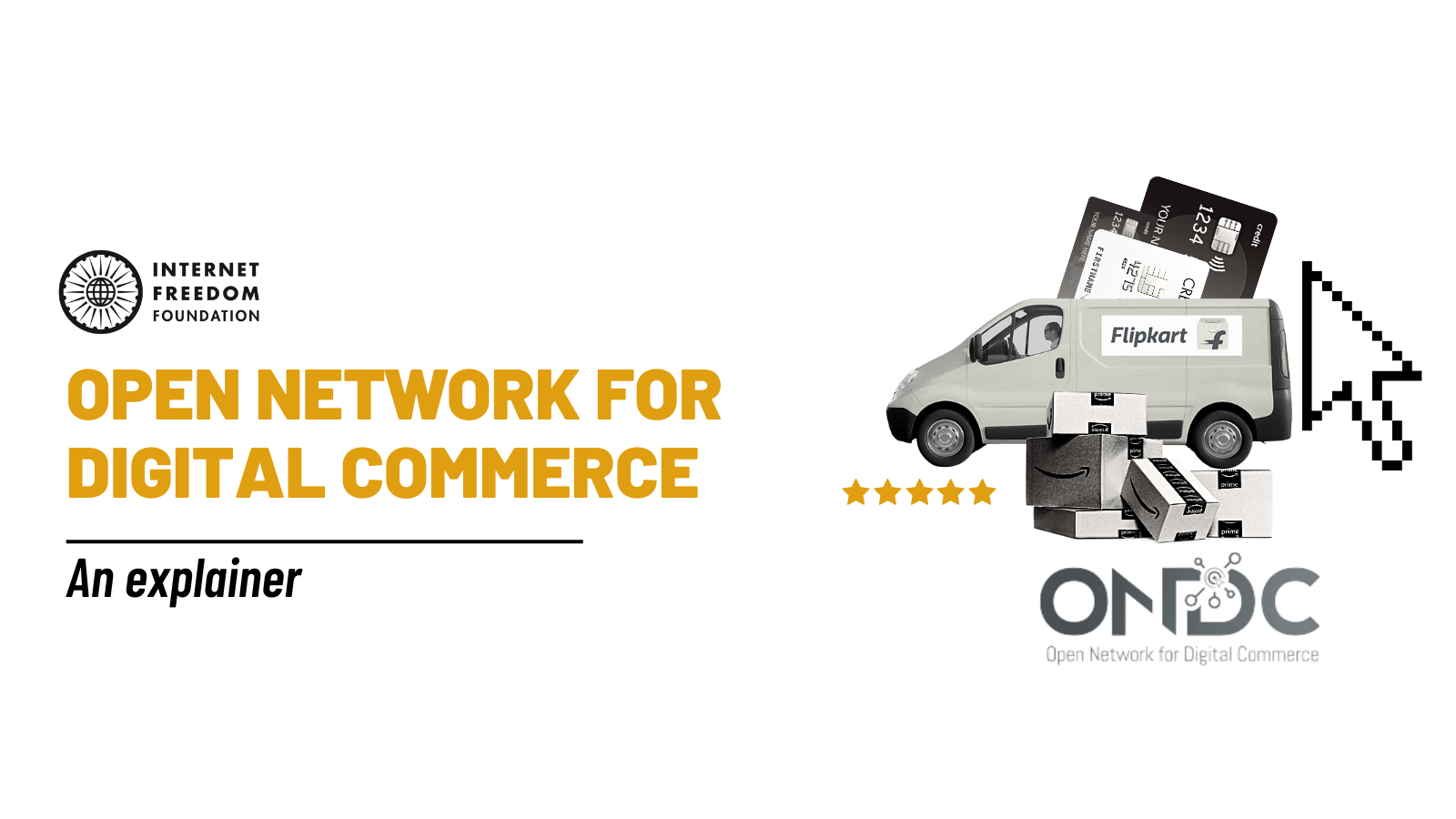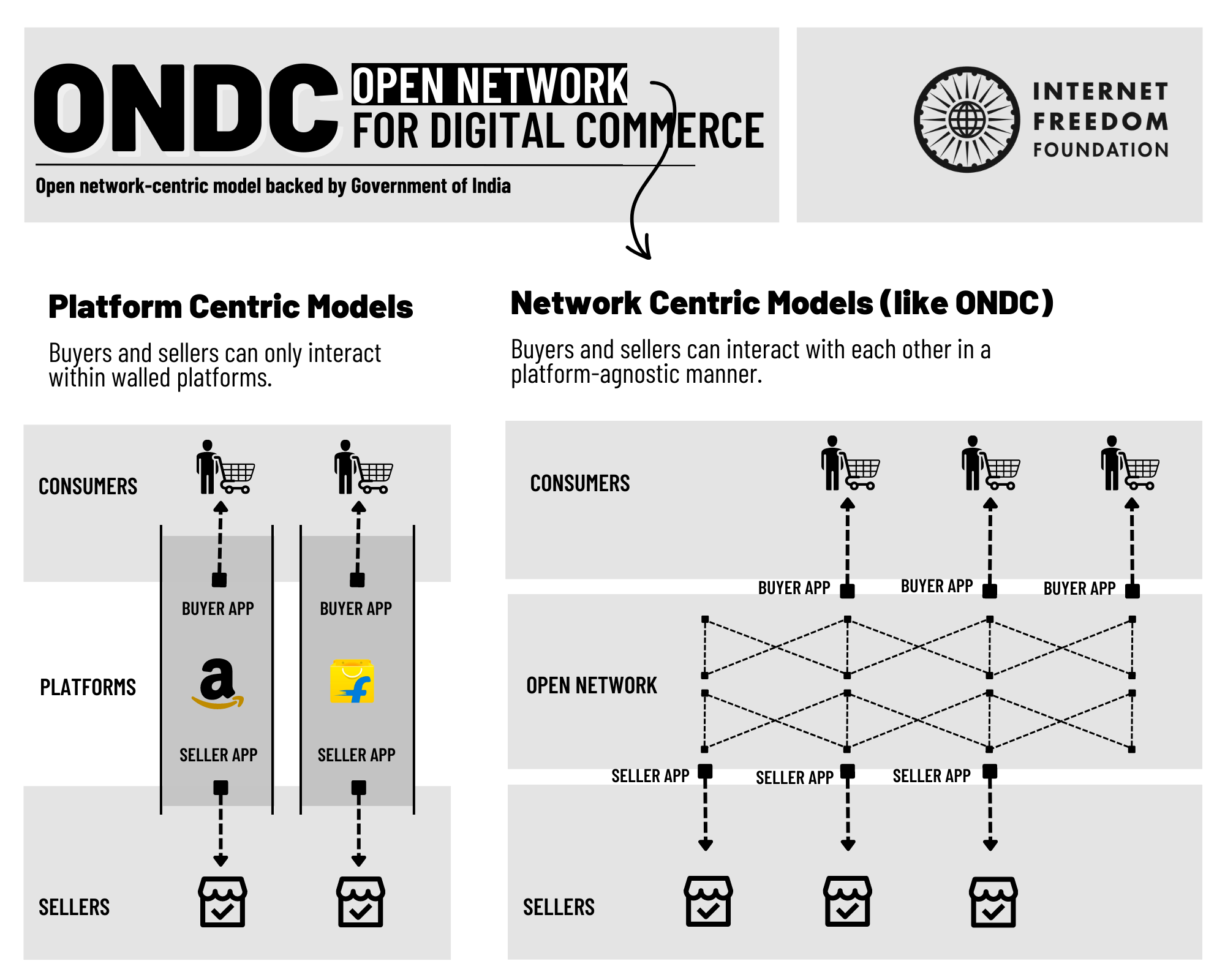
A. ONDC - what it is, and isn’t
The basics
The ‘Open Network for Digital Commerce’ (ONDC), is a Government of India (GoI) backed technology infrastructure. It is a network-centric model, wherein buyers and sellers can transact irrespective of the platforms/applications they use as long as “platforms/applications are connected to this open network”.

In simple terms, ONDC is like a digital road network over which different digital storefronts (in the form of buyer and seller apps) can be built. The digital road network aims to enable e-commerce traffic to travel across these different digital storefronts seamlessly, thereby allowing buyers and sellers to transact regardless of the application / platform they use.
This is a significant departure from existing platform centric models of e-commerce where buyers and sellers can only interact within walled platforms. To illustrate, today, a seller on Amazon cannot reach a buyer on Flipkart, and vice versa. These walled platforms have increasingly dominated transaction volumes in India’s ecommerce market over the years, and today are able to wield immense power and control over e-commerce supply chains. This concentration of power and control has led to harmful behaviour such as self-preferencing by platforms or leveraging data to distort competition, which squarely impacts MSME businesses and the consumer interest.
ONDC is GoI’s answer to this market distortion, but is it really a credible solution? And, also, does it create its own set of unique problems? The following paragraphs discuss these questions in detail.
Who is running the ONDC
The day-to-day operations and governance of the ONDC are managed by a Section 8 (non-profit) company (also called ONDC), which has a GoI led non-profit organisation, an e-governance technology company and some of India’s largest banks as its shareholders.
The Department for Promotion of Industry and Internal Trade (DPIIT) appointed ONDC Advisory Council, under the chairmanship of the Union Commerce Minister, and includes individuals such as Nandan M. Nilekani (Chairman of Infosys) and Arvind Gupta (head of the Digital India Foundation).
It is important to note that the relationship between the GoI and ONDC is not legally defined and it does not flow from an act of parliament. This is an issue we analyse given the public endorsement and advocacy for ONDC by senior public officials and ministerial statements.
Timeline of ONDC
B. Potential challenges
Governance reforms
ONDC has been designed as a Section 8, private sector led, non-profit company. The Ministry is of the opinion that owing to the company’s non-profit structure, it will reduce the incentive for profit maximisation, and keep focus on ethical and responsible behaviour. While the Ministry believes that once the ONDC will provide “rigorous norms of governance” and thus self-regulation will be sufficient, some aspects of governance do require reform. The Ministry does not clearly explain how the ONDC network will be held accountable and how transparency will be maintained. Similar governance issues were witnessed with National Payment Corporation of India (NPCI), which was registered as a “not for-profit” company.
Additionally, although ONDC is the newest arrival in India’s Digital Public Infrastructure (DPI), it still remains owned/ controlled by banks and industrialists. Further, given that ONDC is a Section 8 company and not a public authority, it falls outside the ambit of the Right to Information (RTI) Act, 2005. Moreover, since our fundamental rights are enforceable against the State, aggrieved citizens won’t be able to avail their right to file a writ petition under Article 32 and 226 in case of violation of their rights. The same concerns exist for sellers who may be delisted from the network. The ONDC remains silent on the remedies available to such companies or individuals.
The Delhi Metro Rail Corporation (DMRC) is a good example of a public sector company which has legislative backing and comes under the ambit of the RTI Act, thus increasing public trust, transparency, and accountability, while also allowing citizens to avail protections guaranteed to them by the Constitution. Hence, the various claims made by ONDC need to be supported with adequate roadmaps, such that it reduces ambiguity and increases public confidence.
Safeguards for personal data
E-commerce platforms are able to offer competitive prices and recommendations by using a number of data points. It is unclear how this would translate on ONDC.
The ONDC Strategy Paper suggests that personal data of buyers and competitive data of sellers shall remain siloed within the buyer app and seller app respectively. However, this may play out differently when the same entity operates the buyer and the seller side interface. For instance, reports suggest that large incumbents such as Amazon have shared data within their corporate group under murky privacy terms.
Further, there are concerns with network wide sharing of “anonymized performance metrics”. This does little to assuage fears of re-identification of anonymised data, given that just a handful of data points (such as pincode, date of birth and age) can be used for accurately re-identifying users from anonymised datasets.
As per Network Data Governance Policy chapter of the ONDC Network Policy, ONDC may, over the course of its operations, also receive or collect personal data about a natural person, living or deceased. As per media reporting, policies around the exchange of transaction data will evolve and would be consent-based and bound by the limitation of purpose. This exchange of transaction data as well as collection of personal data, in the absence of a data protection law, raises privacy concerns, and it thus becomes important for ONDC to publish a privacy policy.
While India renewed its efforts towards a rights framework over personal data with the Digital Data Protection Bill, 2022, however, legacy issues with some of the previous iterations of the law remain. We discuss these issues in detail here, and more recently here.
Assigning responsibility and liability
Trust in ONDC will depend on trustworthy buyers and sellers. While e-commerce digitises interactions between consumers and businesses, transaction fulfilment depends on trusted supply chains in the physical space. For instance, at the delivery stage, variables such as quality of packaging, and speed become relevant. Further, issues like fake products, fake reviews are concerns in e-commerce, as are challenges such as user input errors, refused deliveries, order cancellations, delays, breakages, counterfeiting, and fraud.
The ONDC Consultation Paper discusses how standardised digital contracts for each transaction can set out the rights and responsibilities between various network participants. While the terms of these contracts are not yet public, the ONDC Consultation Paper indicates that certain kinds of claims involving “misconduct” or “breach of representations” would carry indemnity provisions. It remains to be seen how small traders would be impacted under this framework of “Transaction-level Contract”.
Any disputes between network participants, or user grievances would be settled as per the ONDC Network Policy. Here, ONDC asserts that it is a mere ‘enabler’ or ‘facilitator’ of ecommerce, and thus disclaims responsibility over the actions of network participants. At the same time however, ONDC enjoys wide powers over network participants, such as the power to suspend or terminate a network participant for non-compliance with its Network Policy. This raises a larger issue in terms of the accountability and responsibility of ONDC itself, especially given that, as stated in the consultation paper, the ONDC will not be a party to a transaction between a buyer and a seller.
ONDC’s position as the enforcer of the Network Policy, without any responsibility for any harm caused to network participants / consumers may increasingly be strained as the network scales, and the volume of disputes / grievances rise.
Ensuring fair competition within ONDC
Open markets tend to create winners and losers. The UPI network is a good example here. While several third-party apps enable payments on the UPI network, ~ 85% traffic on the UPI network flows through only 2 UPI apps. This heavy imbalance forced the NPCI to announce market share caps for UPI apps - a move it had to reassess, fearing disruption to the user experience.
While the ONDC Consultation Paper discusses measures against self-preferening in product search and discovery, large organised players may still operate at a significant advantage. Legacy e-commerce players could operate the buyer and seller side interfaces, while providing logistics services on ONDC. They could as a result offer higher margins to sellers, reduce commissions and offer deeper discounts to users. Over time, legacy players could in fact gain better scores on the ONDC Scoring/Badging System through quality of service, thereby once again concentrating user trust and market activity onto their interfaces.
In such a scenario, given its role as a facilitator, it remains to be seen how ONDC will be able to address any market imbalances that arise.
C. Conclusion
Given our existing concerns with the ONDC model, we wish to end this post with 5 open questions about its capability to address the market issues it promises to resolve.
- How will ONDC solve the issues of market domination and concentration by a few players which can be replicated in “open networks”?
- To what extent will the ONDC be able to solve other prevalent issues on online marketplaces such as sale of harmful objects, inferior quality, delivery failures/ errors, fake reviews and ratings, etc.?
- How will the ONDC protect network participants and/or users from any harm caused if it does not see itself playing any role in a transaction?
- How will the ONDC maintain its accountability to the public as a Section 8 company, given that it falls outside the ambit of the RTI Act and doesn’t allow the citizens to avail constitutionally guaranteed protections?
- How will the ONDC ensure that network participants securely and safely handle/ store/ collect/ receive/ share users’ personal data?
Here's a shareable infographic summarising ONDC, the difference between platform-centric and network-centric models and the concerns around ONDC.
We acknowledge and thank Mr. Ateesh Nandi for his contribution and assistance in drafting this post. He can be reached on his LinkedIn profile here.
Important Documents:
- ONDC Website (link)
- ONDC Strategy Paper (link)
- ONDC Consultation Paper titled “Building Trust in the ONDC Network" (link)
- IFF's letter to the Department for Promotion of Industry and Internal Trade (link)


